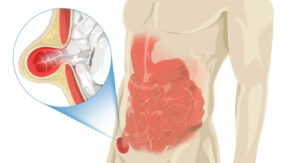An inguinal hernia is a lump or swelling in the groin caused by a weakness in the abdominal wall muscles. The hernia can cause pain, difficulty walking and passing gas, and difficulty with urination.
In cases present in men, it can also lead to reduced testicular size and changes in the sperm count. Inguinal hernias are quite common, occurring in an estimated 27 percent of men and three percent of women at some point in their lives. Often, these types of hernias disappear on their own and most people who get them never even notice that they have one. While these can go relatively undetected, they can come with some negative side effects and for men, there may be some impact on male fertility that they should be aware of.
Causes of Inguinal Hernias in Men
In general, common inguinal hernias form when tissue, such as parts of the abdomen (bowel and fat) protrude through a weak spot in the abdominal muscles and enter into a sac.
While some inguinal hernias have no apparent cause that leads to their onset, others can occur for a variety of reasons, including increased abdominal pressure, weak spots in the abdominal wall, straining during bowel movements or urinations, strenuous activity, or injury or surgery that can weaken the abdominal wall. Additionally, a number of risk factors can elevate the risk for the abdominal wall to weaken and create a place for inguinal hernias to form. These risk factors include abdominal injury or trauma, surgery, diabetes and obesity.
Moreover, in men it can commonly be caused by a weak ligament in an area known as the inguinal ligament, where the spermatic cord enters the scrotum.
Symptoms
For those suffering from this condition, a number of symptoms may be experienced that can indicate the presence of an inguinal hernia.
 1. A bulge in the lower abdomen
1. A bulge in the lower abdomen
On either side of the pubic bone, an inch below the navel, there is a natural pull of several muscles. An inguinal hernia is likely to develop if this general area, causing the lower abdomen to become distended with a bulge.
2. Abdominal pain
This kind of pain or discomfort is especially experienced when heavy lifting is done as well as when sneezing, bending, or coughing. Additional pain sensations can be felt as dull pains and aches in the scrotum that worsen when applying pressure or bending the knees. Pain, aching or burning sensations at the site of a lower abdomen bulge may also be present.
Pain while walking or participating in other activities that require moving the abdominal muscles or an irritating, muscular, or pinching feeling in the lower abdomen, especially after eating or exercising can also become some of the most alarming symptoms.
3. Bathroom difficulties
Including passing stools, gas, and urinating, difficulty can include straining to go or the complete cessation of any or all of these processes.
All of these symptoms may indicate the presence of an inguinal hernia and should they persist, it can be imperative that consultation with a doctor be made for proper treatment.
How Inguinal Hernia Affects Male Fertility
While inguinal hernias can seem relatively harmless in cases of little to no discomfort, they can alter the blood and lymph drainage in the scrotum, a narrow area around the testicles, and can ultimately interfere with sperm production. If left untreated, inguinal hernias can also lead to reduced sperm quality.
The vas deferens, or tube that transports sperm from the testicles to the urethra, may also be affected by the presence of a hernia, Also leading to issues with sperm production or quality. As a result of these impacts on sperm, natural conception by means of sexual intercourse may become more difficult.
The condition can also cause a fertility concern known as hydrocele, in which water-filled cysts become present in the scrotum. If the opening to a sac through the weak spots of the abdominal wall are only wide enough to let in fluid, this creates a hydrocele and can affect one or both testicles and stop sperm production. These hydroceles occur when the opening to the sac is wide, parts of the abdomen (bowel and fat) can enter the sac and make it become an inguinal hernia.
Additional complications include spermatic granuloma, which means scar tissue forms due to scarring, and can reduce the testicles’ size and make them less effective as sperm producers. Left untreated, it might cause chronic pain and infection, leading to hernia recurrence.
Only in cases where inguinal hernias are visible and doctors notice it early, can surgery help cure the condition and prevent complications.
How to Treat Inguinal Hernias
If you have an inguinal hernia, that is not going away on its own, the best thing to do is have it repaired. Depending on the type of surgery, it can either be done in a hospital or under local anesthesia as an outpatient. A surgeon usually does the surgery in the office setting, and the recovery period should last at least three days. The procedure is carried out through a small incision in the groin with two incisions which allow the doctor to identify the hernia and perform a specific repair procedure.
If preferred to have open or laparoscopic surgery, patients can typically go home on the same day of the surgery. Keep in mind that no evidence indicates that open surgery provides better treatments than other approaches, and both procedures can be equally effective.
Although uncommon, there are some of the possible complications associated with inguinal hernia which can be serious if not addressed properly. While congenital defects that increase the chances of acquiring an inguinal hernia cannot be prevented, some tips can help lower the risk of onset such as maintaining a healthy weight, having a high-fiber diet, and practicing proper lifting techniques or avoiding overly heavy lifting. Additionally, quitting smoking can help prevent excessive coughing that may lead to the condition or further aggravate an inguinal hernia.
Like all health concerns, be sure to follow up with a doctor if you suspect that you have a hernia before it worsens.


 1. A bulge in the lower abdomen
1. A bulge in the lower abdomen

